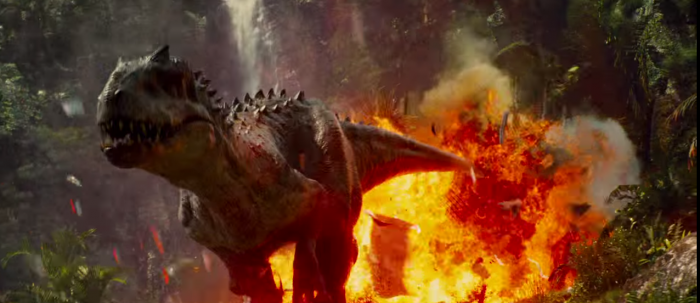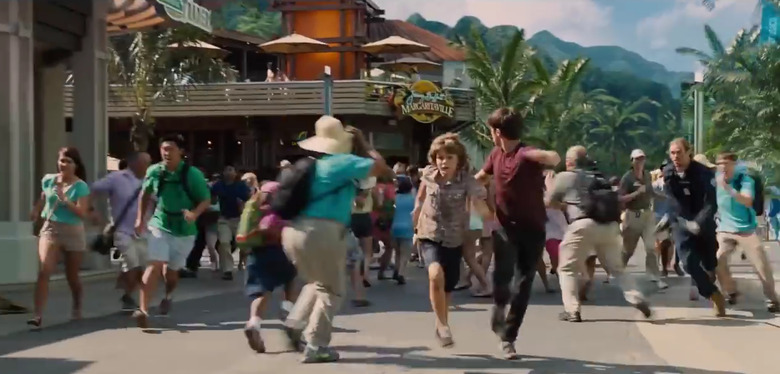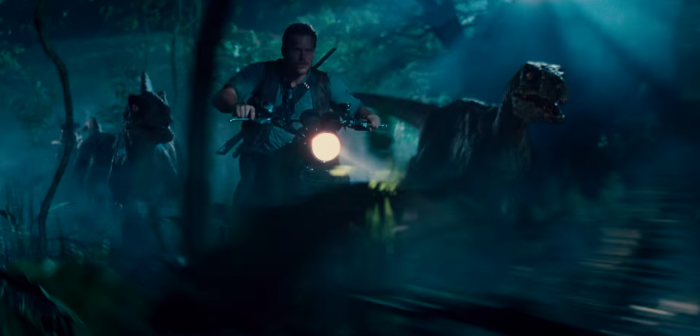Three Ways The Plot Of 'Jurassic World' Is About 'Jurassic World' The Movie
[This article contains major SPOILERS for Jurassic World.]
Jurassic World (see Peter and Germain's reviews) is a film loaded with contradictions. It's a movie that acknowledges and even ridicules standard action film tropes, then goes on to invoke them.
For instance, the movie points out the increasing commercialization and product integration in major studio films, then follows it up with a beauty shot of a Mercedes, driven by velociraptor trainer Owen Grady (Chris Pratt) and park operations manager Claire Dearing (Bryce Dallas Howard). Later, one of the park's operators (Jake Johnson) goes in for a dramatic kiss with a female colleague (Lauren Lapkus), only to be shot down in hilarious fashion – seemingly poking fun at how these films over-dramatize romantic connections. And yet at the end of the film, Grady and Dearing still get a romantic Indiana Jones-esque moment as they walk in silhouette into the distance.
It's a movie that wants to comment on the modern blockbuster, while still playing to that sort of film's worst and basest tendencies. In fact, there were several points throughout the film where I couldn't help but feel as though the plot of the film was a meta commentary on the movie itself.
The Indominus Rex
X
The main plot centers around the Indominus Rex, a genetically engineered hybrid dinosaur that's also perfect killing machine. It wasn't bred, it was "designed" in order to meet the needs of the capitalist engine that powers the Jurassic World (the park).
Trevorrow has spoken about this in explicit detail. In an interview with EW, he explains:
The Indominus was meant to embody our worst tendencies. We're surrounded by wonder and yet we want more. And we want it bigger, faster, louder, better. And in the world of the movie the animal is designed based on a series of corporate focus groups. Like in the same way a lot of movies are. They sit a bunch of people down and they ask them, "What can we do to make the dinosaurs more entertaining for you? What would make you tell a friend to come to Jurassic World?" And their answer is, of course, "We want to see something bigger, faster, louder, more vicious; we want a killer." And they get what what they ask for.
Likewise, the Jurassic films themselves have upped the ante with each subsequent film. In The Lost World, they took the action onto the mainland and in Jurassic Park 3, the Spinosaurus was the big baddy they used to show that this sequel was going to be BIGGER(!) than all the previous films.
And in this film, all that mattered was that this dinosaur was smarter, larger, and scarier. It didn't matter whether or not the creature made a lick of sense (The Indominus can camoflauge itself, apparently! And talk to Velociraptors, conveniently! And...use its tracking device to lure humans into danger? What?). This is the fourth part of a film franchise that has made billions of dollars, seemingly revived just to capitalize on nostalgia and awareness. Jurassic World wants to critique the crass, commercially world in which it's being released, but ends up becoming a vessel through which that world continues to be perpetuated.
Everything is branded
X
When Claire Dearing announces that she's scored Verizon Wireless's branding rights to the Indominus Rex, she does it with a world-weary tone that is echoed by her colleagues in the control room. Everything needs to be branded these days! Integrated marketing is such a beast, amirite guys?!
But Verizon Wireless isn't the only one to get a prominent mention in the film. Mercedes vehicles are all over the place. And we also clearly see the Samsung-branded building, and a nice Starbucks, and a really lovely Pandora jewelry store in the background of a T-Rex fight scene. And in a scene when dinosaurs are diving from the sky and killing people horribly, there's..Jimmy Buffett's Margaritaville? Huh.
In an interview with ScreenCrush, Trevorrow dished on the process, saying:
The product placement and partnerships in this movie is a fascinating sub topic. Everybody who participated was fully aware that the oldest creatures to ever walk the Earth are going to destroy them. They were all OK with that. It was a pretty good trade.
In any case, it's really difficult to critique the over-branding of all entertainment in our society when the thing you've created to make that critique is overflowing with product placement.
It's going to happen with or without you
X
Throughout the movie, Vic Hoskins (Vincent D'Onofrio) has been trying to convince Grady that the right move is to begin using the velociraptors as killing machines for their own ends. Grady balks at this possibility, recognizing its madness. But at a crucial point in the film, when the Indominus is already out on the loose and the humans' prospects for stopping him are dim, Hoskins confronts Grady and tells him that the deployment of velociraptors would proceed with or without him, so he might as well get on board. Grady sensibly joins in, and his actions power the last act of the film.
I recalled all the times that a filmmaker was confronted with the prospect of taking the reigns of a major property or franchise. In many instances, those films are going to happen anyway – the studio's financial statements dictate it. As a filmmaker, you can sit idly by and let these films happen without your involvement, but you'll be missing out on millions of dollars and the possibility that your skills can help guide a project to its completion.
Trevorrow himself has spoken about this situation. In an interview with The Daily Beast, Trevorrow recalled the getting the invitation to work on the film:
The reality of what was going on with us was we looked around and we had a corporation that needed a movie to hit a release date, in order to please its shareholders...And whether that was a good idea or not, that was happening.
Trevorrow took the deal. Who wouldn't? It's an offer that's almost impossible to refuse. But maybe he was so concerned with whether or not he could that he didn't stop to think if he should.



